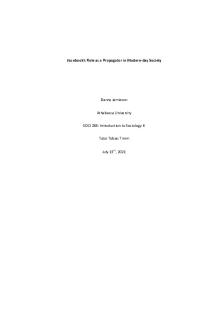Assignment 3 SOCI288 PDF

| Title | Assignment 3 SOCI288 |
|---|---|
| Course | Introduction to Sociology II —Social Movements |
| Institution | Athabasca University |
| Pages | 5 |
| File Size | 78 KB |
| File Type | |
| Total Downloads | 23 |
| Total Views | 172 |
Summary
N/A...
Description
Facebook’s Role as a Propagator in Modern-day Society
Danny Jamieson Athabasca University SOCI 288: Introduction to Sociology II Tutor Tobias Timm July 13th, 2021
Read the article “Why We Should Cut the Facebook Cord,” and analyze that reading in the context of what you learned in this unit, with particular attention paid to the “five important points.” Does Facebook (and other social media) function as a PR/propaganda device in our modern society? In what way is it the same or different from the PR mechanisms of the past?
Mike Sosteric’s article, “Why We Should All Cut the Facebook Cord”, makes, in my opinion, a clear and convincing case for Facebook’s role as a propagator within modern-day society. Sosteric’s article is not the first, nor will it be the last, discussing Facebook’s influence on how society thinks and feels. Netflix’s The Great Hack, through its examination of the Facebook-Cambridge Analytica data scandal, made a very similar and equally convincing case to Sosteric’s. In Sosteric’s article, he refers to an article by Michael W. Austin PHD of Phycology Today (2012) that states that Facebook is more addictive than cocaine. The addictive quality of social media applications like Facebook and Instagram is by design (Weller 2018). Companies have done this intentionally because the more time that a user spends on their application, the more advertising revenue they can generate. Because most social media applications are free, users are the product, and advertisers are the customers. Users are a captive audience for the promotion of product and people and the ideas that they represent. Facebook’s ability to, through its advertisers, influence how users think and feel about something as important as a presidential candidate, for example, is a clear indication that the platform serves as a propaganda tool. Equally as important as Facebook’s ability to monetize its users and their date is its ability to support the mobilization of social movements by providing a space for the exchange of ideas and information. This was evidenced in January 2021, when supporters of President Donald Trump stormed and violently attacked the United States Capitol. NBC News reported that “private Facebook groups spent months advising one another about how to ‘take down’ the government” (Collier, 2021). Just as Facebook knowingly designed the platform to be addictive, it also knew that the platform was “home to
misinformation, hate speech, and threats of violence” (Hamilton, 2021) and did little to nothing to change it. In an August 2020 presentation to Facebook’s executives, researchers shared that "70% of the top 100 most active US Civic Groups are considered non-recommendable for issues such as hate, misinform, bullying and harassment" (Horwitz, 2021). Facebook differs from propaganda and public relations mechanisms of the past because it has allowed individuals and groups, no matter how wealthy or powerful, to share content that furthers their agendas. In the past, however, when propaganda was shared through traditional media platforms like radio and newspaper, social movements required a great deal of wealth and power in order to propagate to the masses.
References Austin, M. W. (2012, February 20). Facebook Addiction? Psychology Today. https://www.psychologytoday.com/us/blog/ethics-everyone/201202/facebook-addiction. Collier, K. (2021, January 21). Some pro-Trump extremists used Facebook to plan Capitol attack, report finds. NBCNews.com. https://www.nbcnews.com/tech/tech-news/some-pro-trump-extremsistsused-facebook-plan-capitol-attack-report-n1254794. Hamilton, I. A. (2021, February 1). Facebook knew it had a huge problem with hateful groups 5 months ahead of the Capitol riot, internal docs show. Business Insider. https://www.businessinsider.com/facebook-civic-groups-internal-docs-capitol-riot-misinformationhate-2021-2. Horwitz, J. (2021, January 31). Facebook Knew Calls for Violence Plagued 'Groups,' Now Plans Overhaul. The Wall Street Journal. https://www.wsj.com/articles/facebook-knew-calls-for-violence-plaguedgroups-now-plans-overhaul-11612131374. Sosteric , M. (2021, June 3). Why we should all cut the Facebook cord. Or should we? The Conversation. https://theconversation.com/why-we-should-all-cut-the-facebook-cord-or-should-we-93929. Weller, C. (2018, February 5). A group of former Facebook and Apple employees are teaming up to warn kids about tech addiction. Business Insider. https://www.businessinsider.com/ex-facebook-andgoogle-employees-launch-anti-tech-addiction-campaign-2018-2....
Similar Free PDFs

Assignment 3 SOCI288
- 5 Pages

Assignment-3 - assignment 3
- 2 Pages

HWA 3 - assignment 3
- 7 Pages

Assignement 3 - assignment 3
- 3 Pages

Prog-3 - Assignment 3
- 2 Pages

Assignment 3
- 11 Pages

Assignment 3
- 4 Pages

Assignment 3
- 4 Pages

Assignment 3
- 1 Pages

Assignment 3
- 2 Pages

Assignment 3
- 9 Pages

Assignment 3
- 3 Pages

Assignment 3
- 7 Pages

Assignment 3
- 6 Pages

Assignment 3
- 5 Pages

Assignment 3
- 2 Pages
Popular Institutions
- Tinajero National High School - Annex
- Politeknik Caltex Riau
- Yokohama City University
- SGT University
- University of Al-Qadisiyah
- Divine Word College of Vigan
- Techniek College Rotterdam
- Universidade de Santiago
- Universiti Teknologi MARA Cawangan Johor Kampus Pasir Gudang
- Poltekkes Kemenkes Yogyakarta
- Baguio City National High School
- Colegio san marcos
- preparatoria uno
- Centro de Bachillerato Tecnológico Industrial y de Servicios No. 107
- Dalian Maritime University
- Quang Trung Secondary School
- Colegio Tecnológico en Informática
- Corporación Regional de Educación Superior
- Grupo CEDVA
- Dar Al Uloom University
- Centro de Estudios Preuniversitarios de la Universidad Nacional de Ingeniería
- 上智大学
- Aakash International School, Nuna Majara
- San Felipe Neri Catholic School
- Kang Chiao International School - New Taipei City
- Misamis Occidental National High School
- Institución Educativa Escuela Normal Juan Ladrilleros
- Kolehiyo ng Pantukan
- Batanes State College
- Instituto Continental
- Sekolah Menengah Kejuruan Kesehatan Kaltara (Tarakan)
- Colegio de La Inmaculada Concepcion - Cebu